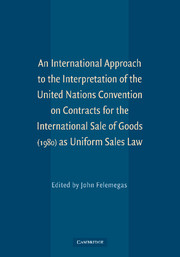Book contents
- Frontmatter
- Contents
- Foreword, by Eric E. Bergsten
- Contributors
- PART ONE INTRODUCTION
- PART TWO CISG–UNIDROIT Principles comparative editorials
- Art. 6 CISG–UP, by Bojidara Borisova [Bulgaria]
- Art. 7 CISG–UP, by Ulrich Magnus [Germany]
- Art. 8 CISG–UP, by Joseph M. Perillo [U.S.A.]
- Art. 9 CISG–UP, by Jorge Oviedo Alban [Colombia]
- Art. 10 CISG–UP, by Allison E. Butler [U.S.A.]
- Art. 11 CISG–UP, by Chantal Niggemann [Germany]
- Art. 13 CISG–UP, by Andrea Charters [U.S.A.]
- Art. 14 CISG–UP, by Jorge Oviedo Alban [Colombia]
- Art. 16 CISG–UP, by Andrea Vincze [Hungary]
- Art. 17 CISG–UP, by Stephen Smith [U.S.A.]
- Art. 18 CISG–UP, by Jorge Oviedo Alban [Colombia]
- Art. 20 CISG–UP, by John Felemegas [Australia]
- Art. 21 CISG–UP, by John Felemegas [Australia]
- Art. 22 CISG–UP, by John Felemegas [Australia]
- Art. 24 CISG–UP, by John Felemegas [Australia]
- Art. 25 CISG–UP, by Robert Koch [Germany]
- Arts. 26/39 CISG–UP–PECL, by Camilla Baasch Andersen [Denmark]
- Art. 27 CISG–UP–PECL, by Chengwei Liu [China]
- Arts. 28, 46, 62 CISG–UP, by John Felemegas [Australia]
- Art. 29 CISG–UP, by Sieg Eiselen [South Africa]
- Art. 35 CISG–UP–PECL, by René Franz Henschel [Denmark]
- Art. 37 CISG–UP, by Bertram Keller [Germany]
- Arts. 47/49 CISG–UP, by Robert Koch [Germany]
- Art. 48 CISG–UP, by Chris Kee [Australia]
- Art. 55 CISG–UP, by Jumpita Ruangvichatron [Thailand]
- Arts. 63/64 CISG–UP, by Robert Koch [Germany]
- Arts. 71/72 CISG–UP, by Sieg Eiselen [South Africa]
- Art. 74 CISG–UP, by Sieg Eiselen [South Africa]
- Art. 75 CISG–UP, by Bojidara Borisova [Bulgaria]
- Art. 76 CISG–UP, by Bruno Zeller [Australia]
- Art. 77 CISG–UP, by Elisabeth Opie [Australia]
- Art. 78 CISG–UP, by Sieg Eiselen [South Africa]
- Art. 79 CISG–UP, by Alejandro M. Garro [Argentina]
- Art. 80 CISG–UP, by Friederike Schäfer [Germany]
- Arts. 81/82 CISG–UP, by Florian Mohs [Switzerland]
- PART THREE CISG–PECL COMPARATIVE EDITORIALS
- Index
Arts. 26/39 CISG–UP–PECL, by Camilla Baasch Andersen [Denmark]
Published online by Cambridge University Press: 20 October 2009
- Frontmatter
- Contents
- Foreword, by Eric E. Bergsten
- Contributors
- PART ONE INTRODUCTION
- PART TWO CISG–UNIDROIT Principles comparative editorials
- Art. 6 CISG–UP, by Bojidara Borisova [Bulgaria]
- Art. 7 CISG–UP, by Ulrich Magnus [Germany]
- Art. 8 CISG–UP, by Joseph M. Perillo [U.S.A.]
- Art. 9 CISG–UP, by Jorge Oviedo Alban [Colombia]
- Art. 10 CISG–UP, by Allison E. Butler [U.S.A.]
- Art. 11 CISG–UP, by Chantal Niggemann [Germany]
- Art. 13 CISG–UP, by Andrea Charters [U.S.A.]
- Art. 14 CISG–UP, by Jorge Oviedo Alban [Colombia]
- Art. 16 CISG–UP, by Andrea Vincze [Hungary]
- Art. 17 CISG–UP, by Stephen Smith [U.S.A.]
- Art. 18 CISG–UP, by Jorge Oviedo Alban [Colombia]
- Art. 20 CISG–UP, by John Felemegas [Australia]
- Art. 21 CISG–UP, by John Felemegas [Australia]
- Art. 22 CISG–UP, by John Felemegas [Australia]
- Art. 24 CISG–UP, by John Felemegas [Australia]
- Art. 25 CISG–UP, by Robert Koch [Germany]
- Arts. 26/39 CISG–UP–PECL, by Camilla Baasch Andersen [Denmark]
- Art. 27 CISG–UP–PECL, by Chengwei Liu [China]
- Arts. 28, 46, 62 CISG–UP, by John Felemegas [Australia]
- Art. 29 CISG–UP, by Sieg Eiselen [South Africa]
- Art. 35 CISG–UP–PECL, by René Franz Henschel [Denmark]
- Art. 37 CISG–UP, by Bertram Keller [Germany]
- Arts. 47/49 CISG–UP, by Robert Koch [Germany]
- Art. 48 CISG–UP, by Chris Kee [Australia]
- Art. 55 CISG–UP, by Jumpita Ruangvichatron [Thailand]
- Arts. 63/64 CISG–UP, by Robert Koch [Germany]
- Arts. 71/72 CISG–UP, by Sieg Eiselen [South Africa]
- Art. 74 CISG–UP, by Sieg Eiselen [South Africa]
- Art. 75 CISG–UP, by Bojidara Borisova [Bulgaria]
- Art. 76 CISG–UP, by Bruno Zeller [Australia]
- Art. 77 CISG–UP, by Elisabeth Opie [Australia]
- Art. 78 CISG–UP, by Sieg Eiselen [South Africa]
- Art. 79 CISG–UP, by Alejandro M. Garro [Argentina]
- Art. 80 CISG–UP, by Friederike Schäfer [Germany]
- Arts. 81/82 CISG–UP, by Florian Mohs [Switzerland]
- PART THREE CISG–PECL COMPARATIVE EDITORIALS
- Index
Summary
INTRODUCTION
Doctrinal writing and case law on the problems of giving notice abound where the CISG is concerned, whereas there are few reported problems with the PECL or UNIDROIT. It is one of the most popular areas of dispute as a proper notification is central to any remedial relief. The second opinion from the CISG Advisory Council focuses on the requirements of examination and notification and contains an overview of the relevant case law on point.
CAVEAT on terminology: Any comparison of notice requirements under the PECL, UNIDROIT, and CISG will unearth a significant difference in terminology. The CISG solely encompasses selected formalities concerning validity of contract (such as form of communication, form of contract: Art. 12), but sets most validity issues outside the sphere of application by way of Article 4(a). It thus does not concern itself with most cases in which the contract is not valid due to misrepresentation, threat, fraud, or a similar formality. It also uses the term “avoid” for termination and revocation as the only language of contract cancellation. In contrast, both the UNIDROIT Principles and the PECL refer to rescission by the term “avoid” and use “termination” for the equivalent of the CISG term “avoidance.” This chapter uses CISG terminology and indicates where it is not used in the same manner in the UNIDROIT Principles and the PECL.
- Type
- Chapter
- Information
- Publisher: Cambridge University PressPrint publication year: 2007
- 1
- Cited by



